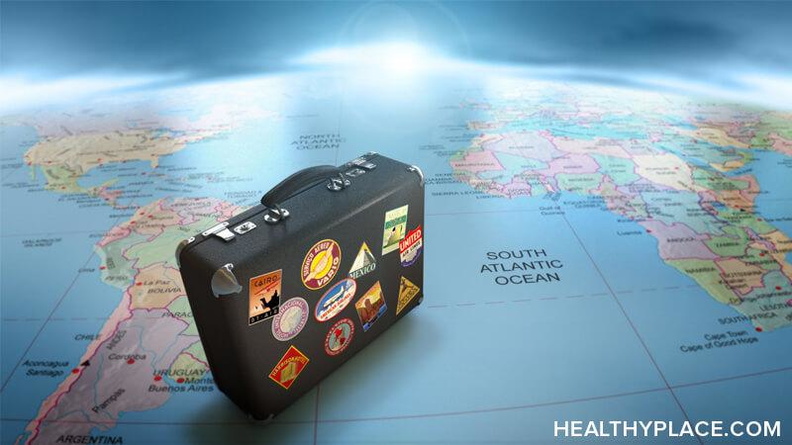Caring for Your Mental Health While Traveling

I've been thinking about caring for your mental health white traveling as I'm writing this on a train, traveling from Montreal to New York City as part of a vacation. While travel within the country is much simpler than travel out of the country, the following vacation tips are good advice for caring for your mental health while traveling.
3 Tips for Caring for Your Mental Health While Traveling
1. Follow Medication Laws to the Letter
If you're going overseas, make sure your medications are in prescription bottles with your name on the label. A note from your doctor may be required but is a good idea even if not required in case of an emergency. Declare any medications that are controlled substances when crossing the border--in my case, I declared one while returning to the U.S. (I didn't get questioned in Canada). Before you go, make sure your medications are legal in any country you're traveling to, even if you're just stopping for a layover. If one is illegal, talk to your doctor about finding a substitute. If you're in doubt, call the consulate of the country you're traveling to.
This is also good mental health travel advice within the United States (e.g., if you get pulled over and they search your car). It is always good to have a list of medications, their doses, and when you take them on your person, but in a pinch, the prescription bottles will do. Documentation of a mental health condition is also helpful to have in case of an emergency. Be informed about your medication in case you have an adverse reaction or a drug interaction.
2. Stay Regular
 As embarrassing as it is to write about this, it's a tip that could save you from disaster. Nurses ask hospitalized psychiatric patients about their bowel movements or lack thereof for a reason. Just as Montezuma's Revenge can lead to a mental health crisis by affecting the level of medication in your bloodstream and the resulting dehydration can cause havoc with one's symptoms, traveler's constipation can cause problems as well. For example, the pressure on the colon can cause a fight-flight-freeze reaction--the last thing we need while on the road. Traveler's constipation, which Reader's Digest reports can affect 40 percent of travelers, can also cause toxins to build up in the body, causing mental health symptoms.
As embarrassing as it is to write about this, it's a tip that could save you from disaster. Nurses ask hospitalized psychiatric patients about their bowel movements or lack thereof for a reason. Just as Montezuma's Revenge can lead to a mental health crisis by affecting the level of medication in your bloodstream and the resulting dehydration can cause havoc with one's symptoms, traveler's constipation can cause problems as well. For example, the pressure on the colon can cause a fight-flight-freeze reaction--the last thing we need while on the road. Traveler's constipation, which Reader's Digest reports can affect 40 percent of travelers, can also cause toxins to build up in the body, causing mental health symptoms.
So stay regular. The main reason people develop traveler's bowel issues is because they change their diet while on vacation (Can Diet Affect Mental Health?). While it is good to venture out and try new foods, don't stray too far from what you usually eat. Also, bring both anti-diarrhea medication and laxatives, or something designed to keep you regular. I can't really recommend anything here so ask your doctor for advice.
Other tips for staying regular are to walk frequently, use the bathroom when necessary instead of holding it, eat adequate fiber, stay hydrated, watch out for jet lag, and don't eat too much protein. Also, monitor your alcohol intake and be wary of any recreational drugs.
3. Have a Crisis Plan Ready
My psychiatrist is fond of saying, "What you prepare for never happens."
Any mental health consumer traveling should have a psychiatric crisis plan as being in a new place can be enough to trigger psychiatric symptoms. Find out if your insurance is valid in the area you're planning to go to (Medicare is not valid abroad, by the way). If you're going overseas, have evacuation insurance (veterans and their families can get it through Veterans Advantage for the cost of membership). This is where your prescription bottles and a note from your doctor can be invaluable--my recently retired corporate American father is fond of saying, "If it ain't documented, it didn't happen."
Likewise, if you don't have documentation, you may as well not have a history.
Know who to call in case of a crisis. See our list of hotlines and resources as a starting point.
Additionally, CrisisChat.org has links to international crisis lines. The National Suicide Prevention Lifeline website has links to all 50 states' crisis hotlines. A simple Google search can be helpful as well. If you're overseas, call the U.S. Embassy or nearest consulate for a list of medical professionals in the area, keeping in mind that just because they're on the government's list of providers does not mean the government recommends them--it may mean they're the only one that speaks English.
See Also:
- Bipolar and Vacation Planning
- Coping With Anxiety When You Travel: Will I Be Okay?
- Going on Vacation With Schizophrenia, Schizoaffective Disorder
- Don't Let Travel Anxiety and PTSD Trap You at Home
- Tips for Traveling with Depression to Avoid Anxiety
- Travel Anxiety: 4 Ways to Prevent Anxiety When Traveling
You can also find Becky Oberg on Google+, Facebook and Twitter and Linkedin.
APA Reference
Oberg, B.
(2017, March 6). Caring for Your Mental Health While Traveling, HealthyPlace. Retrieved
on 2025, December 7 from https://www.healthyplace.com/blogs/recoveringfrommentalillness/2017/03/caring-for-your-mental-health-while-traveling